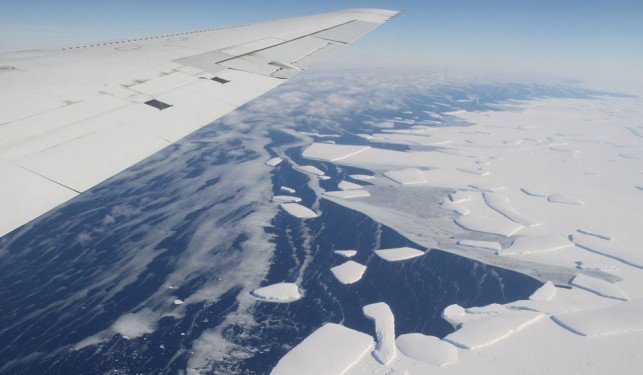A new study finds sea-level rise isn’t the only thing to fear about melting glaciers.

Antarctic Ice Shelf Loss Comes From Underneath by NASA Goddard Space Flight Center \ CC BY 2.0 via Flickr
WE KNOW SEA levels are rising as climate change causes glaciers to melt. But it turns out rising seas may not be the only catastrophic by-product of glacier melt we need to worry about.
A new study from researchers at Florida State University published this week in the journal Nature Geoscience has discovered there will be a substantial carbon impact resulting from the loss of glaciers and ice sheets that cover roughly 11 per cent of the Earth’s surface.
Glaciers act as sinks for both local and distant sources of carbon, CO₂ that is then released downstream if and when the ice melts or breaks away into the sea.
Robert Spencer, a professor of oceanography at Florida State working with researchers in Alaska and Switzerland, used measurements of ice sheets from Greenland, the Antarctic and mountain glaciers from around the world to determine just how much carbon was being stored there and how quickly they anticipate its release.
The results aren’t good. Spencer and his colleague Eran Hood, an environmental scientist at the University of Alaska Southeast, predict the outflow of organic carbon will increase by 50 per cent by 2050.
But the Antarctic ice appears more stable than ice contained in Greenland or on mountain peaks. It’s the mountain glaciers that are likely to release the largest volume of dissolved organic carbon, they found, while the Greenland sheets are projected to release the largest volume of particulate organic carbon. (Dissolved organic carbon can pass through a 0.45 micrometre filter, whereas particulate organic carbon contains particles larger than 0.45 micrometres and cannot pass through the same filter.)
The Antarctic Ice Sheet contains roughly six petagrams of organic carbon (approximately six trillion kilograms) in its glacier ice, more than the carbon stored in mountain glaciers or the Greenland Ice Sheet.
Spencer and Hood also found that loss of glacier mass is responsible for roughly 13 per cent of the yearly fluctuation in how much dissolved organic carbon a glacier releases. Other factors impacting glacier melt include warming temperatures, evaporation and scouring by wind.
Climate change is speeding up the process. Glacier melt is expected to result in a cumulative release of 15 teragrams (15 billion kilograms) of CO₂ by 2050. This is “equivalent to about half of the annual flux of dissolved organic carbon from the Amazon River,” according to the report.
“The loss of glacier mass worldwide, along with the corresponding release of carbon, will affect high-latitude marine ecosystems, particularly those surrounding the major ice sheets that now receive fairly limited land-to-ocean fluxes of organic carbon,” Hood said in a release.
Melting glaciers and ice sheets, which contain approximately 70 per cent of the Earth’s freshwater, have long been known to contribute to rising sea levels. But their role in sea-level rise was also questioned this week with a new study published January 14 in the journal Nature.
Carling Hay and Eric Morrow, fellows in the Department of Earth and Planetary Sciences at Harvard University, shows the previous estimates of global sea-level rise from 1900 to 1990 (between 1.5 millimetres and 1.8 millimetres per year) were over-estimated by as much as 30 per cent. The rise was closer to 1.2 millimetres annually, they suggest.
The Earth’s oceans have been rising at a much faster rate than previously imagined.
This isn’t cause to celebrate, however. The sea-level rise since 1990 has been systematically low-balled, they believe. Hay and Morrow argue that, for the past 25 years, the Earth’s oceans having been rising at a much faster rate than previously imagined.
Discussion
No comments yet.